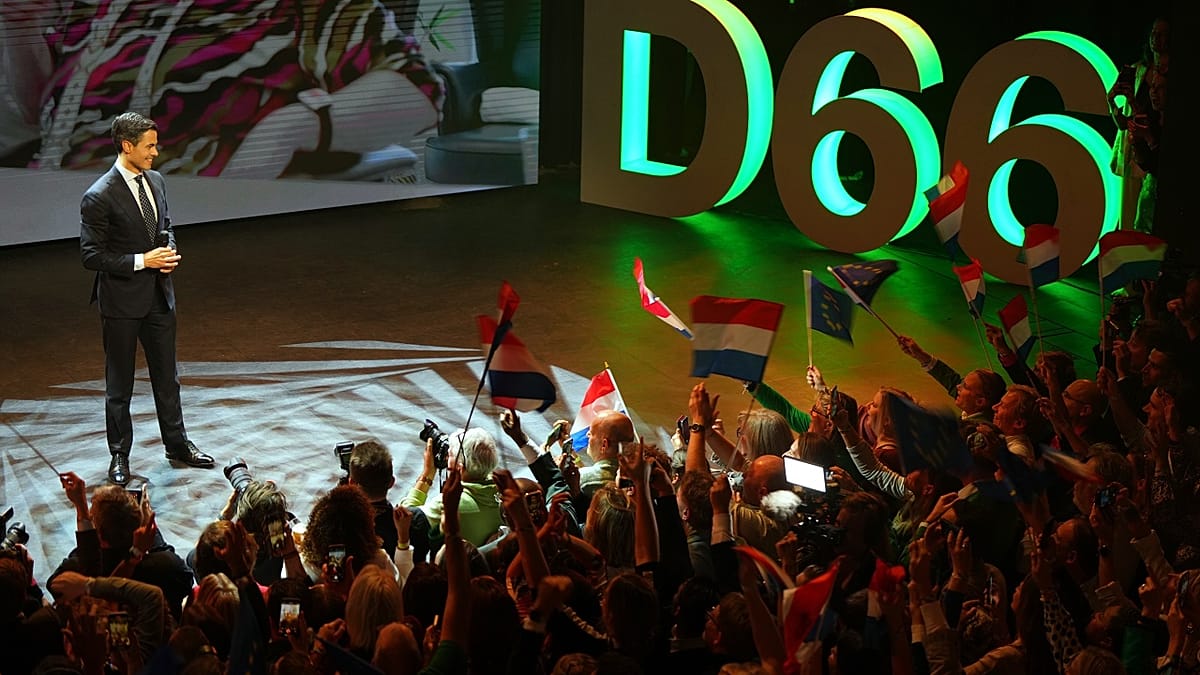The Dutch voted in parliament on Wednesday and the results were close, with right-wing Party of Freedom (PPV) leader Geert Wilders and D66 Emerging Progress Party leader Rob Jetten both winning 26 seats.
As of Thursday morning, with more than 98% of votes counted, the difference between the two parties was just 2,000 votes. It may take several days for final results to be confirmed. Here’s what we know so far:
1. (Unexpected) rise in D66
D66 was expected to win just 17 seats compared to the 26 it received in the vote.
In the end, what did we like about the D66?
Mr Jetten, 38, who became Liberal leader in 2023, appeared to have succeeded in persuading voters with his performance in the last televised debate.
Jetten, who won nine seats in the 150-member parliament in the last election in 2023, performed well in his first campaign broadcast just two weeks ago. Wilders did not participate and temporarily suspended his campaign after receiving terrorist threats against him.
While Wilders has been out of the spotlight, Jetten’s optimism and promise to build a constructive coalition appear to have resonated with Dutch public opinion.
The party on Wednesday recorded its best result since its founding in 1966, a first for a group that tends to either perform very well or significantly underperform in elections.
“Today, millions of Dutch people have chosen a politics that allows them to turn the negative page and look forward again,” Jetten said in a speech following the exit poll results from Leiden, the election venue.
2. The center-left suffers a huge loss and Frans Timmermans resigns.
The centre-left coalition of GroenLinks and PvdA, a joint list combining the Greens and the Dutch Labor Party, suffered significant losses on a disappointing night.
In the last election held in 2023, the party came in second place, compared to fourth place in yesterday’s vote. In both cases, former Secretary-General Frans Timmermans, known as the father of the Green Deal, was the frontrunner.
This time, under his leadership, his party lost 5 seats compared to 2023.
As a result, Timmermans acknowledged his poor performance on Wednesday night and announced that he would step down from his position to make room for the next generation.
“We are very disappointed in our result because we fought very hard for this result,” Timmermans said in his speech.
“It’s clear that we haven’t been able to convince people to vote for us, and I take responsibility for that,” he said.
3. Big loss for PVV
It was a great night for Wilder either way. The right-wing firebrand is narrowly vying for first place in D66, but has lost seven seats compared to 2023.
His goal of becoming Prime Minister of the Netherlands became virtually impossible even if his group won the first place. With the rise of progressives and the reluctance of several groups to work with him, Mr. Wilders does not have a clear path to forming a government. Still, he did not give up on his high ambitions.
“We expected a different result,” Wilders told X. “We are more combative than ever, but we are still the second and probably the largest party in the Netherlands.”
The PVV will become the largest political party for the first time in 2023, and will also enter the cabinet for the first time as a coalition partner.
Although the party lost seats, other far-right parties, JA21 and Forum for Democracy (FvD), fared well, demonstrating continued support for hard-right policies among Dutch voters.
JA21 won eight seats, up from just one in the previous election, and FvD won seven seats in the 2023 vote, up from three.
“The election results do not signal the end of Dutch populism. The PVV may have lost seats, but the far-right vote has not disappeared, it has split. Around 30% of PVV voters in 2023 are now voting for JA21,” said Armida van Liesge, a senior researcher at the Center for European Reform (CER) think tank.
4. What does it mean for Europe?
The outgoing right-wing Dutch government, led by former director of national intelligence and independent technocrat Dick Schuch, struggled in Brussels.
Schauf, an independent, has no party support, in contrast to other European leaders who usually belong to political groups, and constant tensions within his cabinet and subsequent reshuffle have destabilized his policies, in contrast to his predecessor Mark Rutte’s influential European position.
Rutte, now NATO chief, was prime minister for 14 years and put the Netherlands at the center of EU debates over the common budget, defense and immigration.
Analysts say that if the pro-European Jetten, who is aligned with Emmanuel Macron’s liberal Renew political family, succeeds in forming a government, he could give the Netherlands a stronger voice, similar to that of former leader Mark Rutte.
The Netherlands is a founding member of the European Union.
5. It will be difficult to form a coalition, and VVD will be the key
One thing is clear: forming a coalition government will not be easy.
Each party needs a total of 76 seats to form a majority.
Surprisingly, the key to this number will be in the hands of the centre-right VVD.
Since there is no majority, the next government will be a coalition government. Any form of coalition government, be it a centre-left or centre-right agreement, will require the support of the VVD.
The party, formerly led by Rutte and now led by Dilan Ecilges, is expected to win 22 seats, just two fewer than in the 2023 election.
This is surprising. This is because it would show that the party is far to the right in its coalition with Wilders’ party, and that it has not been punished for its failure to maintain power, which led to a snap election. The coalition government collapsed in June this year after fundamental disagreements over immigration.
Other coalition partners, the conservative NSC and the farmers’ interest party BBB, both suffered heavy losses, as did the PVV. Analysts have suggested that the three were punished for their poor performance in government, falling far short of what they promised when they took office. The NSC disappeared from the Dutch political map after losing all its seats last night.
It took more than six months to reach a coalition agreement in 2023, and the instability undermined the Netherlands’ negotiating position in Brussels.








